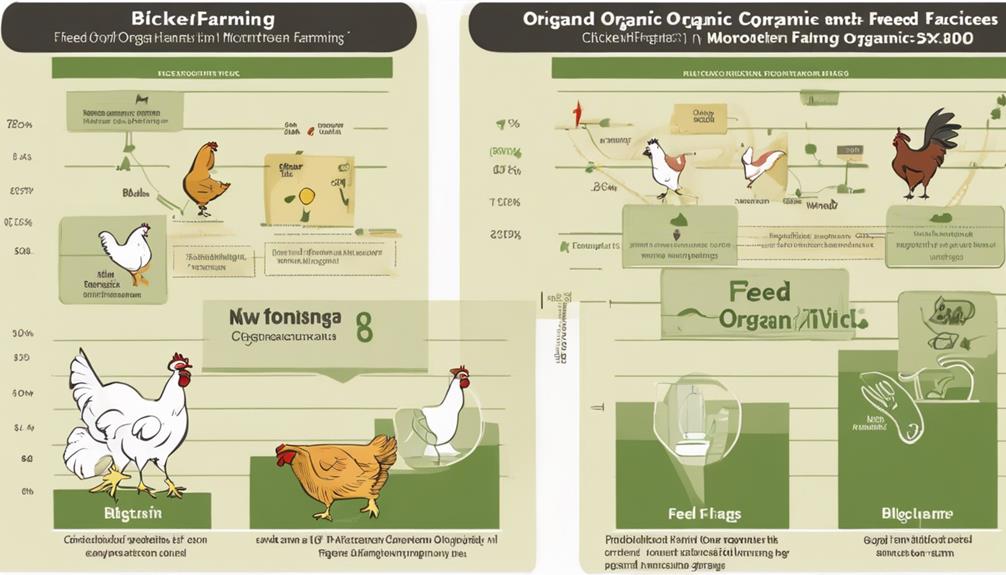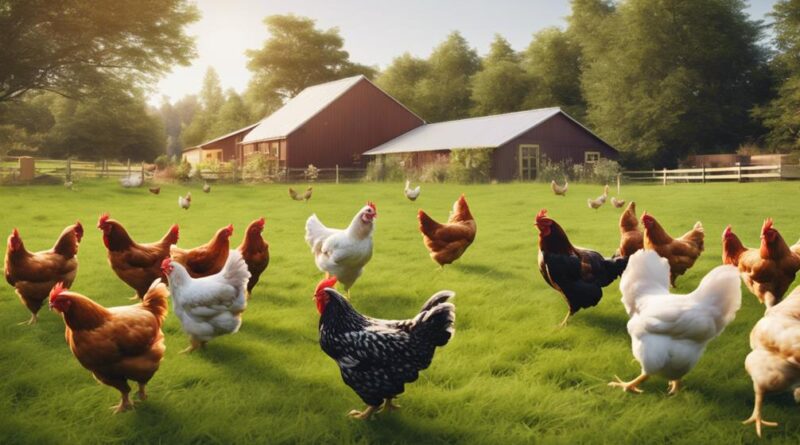7 Best Strategies for Profitable Organic Chicken Farming
Enhance your organic chicken farming profitability by focusing on soil health, efficient feed management, rotational grazing to prevent soil depletion, disease prevention, cost-effective housing, strategic marketing, and financial optimization. Implement soil tests, composting, and rotational grazing. Provide a balanced diet, establish vaccination schedules, and ensure biosecurity. Use sustainable housing, conduct market research, and engage in diverse marketing strategies. Regularly analyze finances, track key metrics, and adjust strategies accordingly. By following these strategies, you can boost your organic chicken farm's success and profitability significantly.
Soil Health for Organic Chickens
To ensure optimal soil health for your organic chickens, regularly test the soil for nutrient levels and pH balance. Maintaining nutrient-rich pastures is essential for the health and productivity of your flock. One effective way to enhance soil fertility is through composting. Composting benefits your soil by adding organic matter, improving soil structure, and increasing nutrient availability for plants. By composting organic materials such as chicken manure, crop residues, and kitchen scraps, you can create a nutrient-rich soil amendment that will support the growth of healthy pasture grasses.
In addition to composting, rotating your chickens on different sections of the pasture can help prevent overgrazing and soil depletion. This practice allows the soil to recover and replenish nutrients naturally. Utilizing rotational grazing systems not only benefits the soil but also promotes healthier pastures for your chickens to forage on. Healthy pastures provide a diverse range of plants for your chickens to eat, increasing the nutritional content of their diet and reducing the need for supplemental feed.
Regularly monitoring and adjusting the nutrient levels and pH balance of your soil ensures that it remains fertile and suitable for growing nutrient-rich grasses. By incorporating composting practices and maintaining healthy pastures, you can create an environment that supports the overall well-being of your organic chickens.
Efficient Feed Management Techniques
Efficient management of feed plays a critical role in optimizing the health and productivity of organic chickens on your farm. When it comes to feed composition, organic chickens require a well-balanced diet rich in nutrients such as protein, vitamins, and minerals. Ensure that the feed provided is certified organic and free from synthetic additives or pesticides. Consider a mix of grains, seeds, and greens to meet their nutritional needs adequately.
In addition to the feed composition, establishing a proper feeding schedule is essential. Organic chickens thrive on consistency, so aim to feed them at the same times each day. Providing access to fresh, clean water at all times is also crucial for their health and digestion. Monitor their feed intake regularly to adjust the quantities as needed based on the size and age of your flock.
Efficient feed management techniques also involve minimizing waste. Store the feed in a dry and secure area to prevent spoilage and contamination. Use feeders designed to reduce spillage and avoid overfilling them. Regularly clean the feeding equipment to maintain hygiene standards and prevent the spread of diseases among your chickens.
Implementing Rotational Grazing Systems
Implementing rotational grazing systems is a proven method for optimizing pasture utilization and promoting natural foraging behaviors in organic chicken farming. Pasture rotation involves dividing the land into smaller sections and moving the chicken flocks between these sections at regular intervals. This strategy provides several grazing benefits for both the chickens and the pasture itself.
Rotational grazing allows chickens access to fresh vegetation regularly, which is essential for their diet and overall health. The chickens can forage on a diverse range of plants, insects, and seeds, mimicking their natural behavior in the wild. This not only improves the nutritional quality of their diet but also reduces the need for supplemental feed, lowering production costs.
Moreover, pasture rotation helps prevent soil erosion and allows the land to recover between grazing periods. By moving the chickens to different sections, the grazed areas have time to regrow, maintaining a healthy and sustainable pasture. This also helps in managing parasites and pathogens, as the chickens aren't continuously exposed to the same environment.
Disease Prevention and Management
For optimal organic chicken farming, effective disease prevention and management protocols are crucial to ensure the health and well-being of the flock. Implementing proper vaccination schedules is essential to protect chickens from common diseases. Vaccines help build immunity and reduce the risk of outbreaks. Work closely with a veterinarian to develop a vaccination plan tailored to your flock's specific needs and the prevalent diseases in your region.
In addition to vaccinations, biosecurity measures play a key role in preventing the introduction and spread of diseases. Implement strict protocols to control access to your farm, including disinfection stations, visitor restrictions, and quarantine areas for new birds. By limiting exposure to external pathogens, you can minimize the risk of disease transmission within your flock.
Consider incorporating holistic veterinary care into your disease management strategy. Holistic approaches focus on boosting overall health and immunity, making chickens less susceptible to illnesses. Natural remedies like herbal supplements, essential oils, and probiotics can support the immune system and aid in recovery from common ailments. Consult with a holistic veterinarian to explore alternative treatments that promote wellness in your chickens.
Cost-Effective Housing Solutions
Consider utilizing cost-effective housing solutions that prioritize both functionality and sustainability to maximize efficiency in your organic chicken farming operation. When it comes to affordable shelters for your chickens, using sustainable materials can significantly reduce costs in the long run. Opting for materials like recycled wood, bamboo, or even reclaimed metal can be both cost-effective and environmentally friendly. These materials are durable, readily available, and often cheaper than traditional options.
To further cut down on expenses, consider designing your chicken coops with natural ventilation and insulation in mind. Proper ventilation not only ensures good air quality for your chickens but also helps regulate temperature, reducing the need for additional heating or cooling systems. Insulation, such as straw or recycled denim, can help maintain a comfortable environment for the chickens, especially during extreme weather conditions.
Another cost-effective housing solution is to utilize movable coops or chicken tractors. These structures allow you to easily rotate your chickens to fresh grazing areas, reducing feed costs and preventing soil nutrient depletion. Additionally, these portable shelters can serve as protection from predators while enabling your chickens to forage freely.
Marketing Organic Chicken Products
To effectively market your organic chicken products, understanding consumer preferences and trends is crucial for maximizing sales and brand visibility. Conduct market research to identify target demographics interested in organic poultry products. Utilize social media platforms to engage with potential customers, share information about your farm practices, and showcase the benefits of choosing organic chicken. Implementing effective branding strategies can help differentiate your products in a competitive market. Create a unique brand identity that highlights the quality, sustainability, and health benefits of your organic chicken.
Utilize social media channels such as Instagram, Facebook, and Twitter to connect with consumers and build a loyal following. Share behind-the-scenes glimpses of your farm, customer testimonials, and cooking tips to engage your audience. Collaborate with influencers or food bloggers who align with your brand values to reach a broader network of potential customers. Encourage satisfied customers to leave reviews and share their experiences online to enhance credibility and attract new buyers.
Consider participating in local farmers' markets, food festivals, or partnering with restaurants that prioritize organic and locally-sourced ingredients. Host farm tours or workshops to educate the community about organic farming practices and the benefits of consuming organic chicken. By implementing a comprehensive marketing strategy that leverages social media and effective branding techniques, you can increase awareness of your organic chicken products and drive sales growth.
Monitoring and Maximizing Profit Margins

To optimize your organic chicken farming venture, closely monitoring and actively seeking ways to maximize profit margins is key to long-term success. Conducting regular financial analysis is crucial in understanding the financial health of your operation. By tracking expenses, revenues, and profits, you can identify areas where costs can be reduced or where prices can be adjusted to increase profitability. Market research plays a vital role in maximizing profit margins. Stay informed about market trends, consumer preferences, and competitor pricing to ensure that you're positioning your organic chicken products competitively.
Financial analysis allows you to assess the efficiency of your operations and make informed decisions to improve profitability. By analyzing key financial ratios such as return on investment, gross margin, and net profit margin, you can gain valuable insights into the financial performance of your organic chicken farming business. This data-driven approach enables you to make adjustments to your production processes, pricing strategies, and marketing efforts to enhance profitability.
In addition to financial analysis, market research provides valuable information that can help you identify new opportunities for growth and expansion. By understanding the demand for organic chicken products in your target market, you can tailor your production and marketing strategies to meet consumer needs effectively. Continuously monitoring and maximizing profit margins through financial analysis and market research will ensure the long-term success and sustainability of your organic chicken farming venture.
Frequently Asked Questions
How Can I Ensure My Organic Chickens Are Ethically Raised?
To ensure your organic chickens are ethically raised, prioritize ethical sourcing practices and stringent animal welfare standards. Implement transparent supply chains and traceability measures to guarantee the origins of your chickens and the conditions in which they're raised.
Regularly assess and improve living conditions, access to outdoor spaces, and healthcare for your flock to promote their well-being. Establish clear guidelines for ethical treatment and monitor compliance closely for a sustainable and responsible approach.
What Are the Best Natural Supplements for Chicken Feed?
To enhance your chickens' diet, nutrient-rich additives like flaxseed meal and kelp can boost their health. Herbal remedies such as garlic and oregano can also improve their immune system. These supplements can aid in overall well-being and may reduce the need for antibiotics.
Be sure to research proper dosages and consult with a poultry nutritionist to ensure optimal results for your flock.
How Can Rotational Grazing Benefit My Organic Chicken Farm?
Rotational grazing is crucial for your organic chicken farm. It involves dividing pastures into sections, letting chickens graze one area while the others recover. This method benefits soil health and pasture quality, promoting sustainability.
Grazing management boosts nutrient distribution, reduces parasite buildup, and enhances vegetation regrowth. By implementing a strategic rotation system, you can optimize your land use, ensuring your chickens have access to fresh, nutritious forage while maintaining a healthy environment.
What Are Common Signs of Disease in Organic Chickens?
Early detection of diseases in organic chickens is crucial for prevention. Common signs include decreased egg production, respiratory issues, and changes in behavior or appearance.
Diagnostic tools such as blood tests and fecal exams can help identify the specific disease. Quick intervention through proper treatment protocols is essential for maintaining the health of your flock.
Regular monitoring and consultation with a veterinarian are key to ensuring the well-being of your organic chickens.
How Can I Differentiate My Organic Chicken Products in the Market?
To differentiate your organic chicken products in the market, consider unique packaging and premium pricing. Eye-catching packaging can attract customers and communicate the quality of your products.
Premium pricing can position your chicken as a high-quality, exclusive option. By combining these strategies, you can set your organic chicken products apart from competitors and appeal to consumers looking for superior, distinctive options in the market.
Conclusion
In conclusion, by focusing on:
- Soil health,
- Efficient feed management,
- Rotational grazing,
- Disease prevention,
- Cost-effective housing,
- Marketing strategies, and
- Monitoring profit margins,
you can create a successful and profitable organic chicken farming operation.
Implementing these strategies won't only benefit your chickens' health and well-being, but also ensure a sustainable and lucrative business model.
Stay committed to these best practices to maximize your success in the organic chicken farming industry.
Happy farming!
